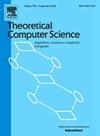Recognizing and eliciting weakly single crossing profiles on trees
IF 1
4区 计算机科学
Q3 COMPUTER SCIENCE, THEORY & METHODS
引用次数: 0
Abstract
Single crossing profiles on trees are not downward closed — a sub-profile of a single crossing profile on trees is not necessarily a single crossing profile on trees. We define weakly single-crossing profiles on trees to be all single crossing profiles on trees and their sub-profiles thereby restoring downward closedness. We design a polynomial-time algorithm for recognizing these profiles. We then develop an efficient elicitation algorithm for this domain which works even if the preferences can be accessed only sequentially and the underlying single-crossing tree structure is not known beforehand. We complement our algorithmic results by proving a matching lower bound on the query complexity of our elicitation algorithm when the number of voters is large compared to the number of candidates. We also prove a lower bound of on the number of queries that any algorithm needs to ask to elicit single-crossing profile when random queries are allowed. This resolves an open question in [18] and proves optimality of their preference elicitation algorithm when random queries are allowed.
识别和引出树木上微弱的单一交叉轮廓
树木上的单个交叉剖面不是向下闭合的——树木上单个交叉剖面的子剖面不一定是树木上的单个交叉剖面。我们将树上的弱单交剖面定义为树上的所有单交剖面及其子剖面,从而恢复树上的向下闭合性。我们设计了一个多项式时间算法来识别这些轮廓。然后,我们为这个领域开发了一个有效的启发算法,即使偏好只能顺序访问,并且潜在的单交叉树结构事先不知道,该算法也能工作。我们通过证明当选民数量大于候选人数量时,我们的启发算法的查询复杂性的匹配下界来补充我们的算法结果。我们还证明了在允许随机查询的情况下,任何算法需要查询的查询次数的下界Ω(m2log (n))。这解决了[18]中的一个开放问题,并证明了在允许随机查询时他们的偏好激发算法的最优性。
本文章由计算机程序翻译,如有差异,请以英文原文为准。
求助全文
约1分钟内获得全文
求助全文
来源期刊

Theoretical Computer Science
工程技术-计算机:理论方法
CiteScore
2.60
自引率
18.20%
发文量
471
审稿时长
12.6 months
期刊介绍:
Theoretical Computer Science is mathematical and abstract in spirit, but it derives its motivation from practical and everyday computation. Its aim is to understand the nature of computation and, as a consequence of this understanding, provide more efficient methodologies. All papers introducing or studying mathematical, logic and formal concepts and methods are welcome, provided that their motivation is clearly drawn from the field of computing.
 求助内容:
求助内容: 应助结果提醒方式:
应助结果提醒方式:


